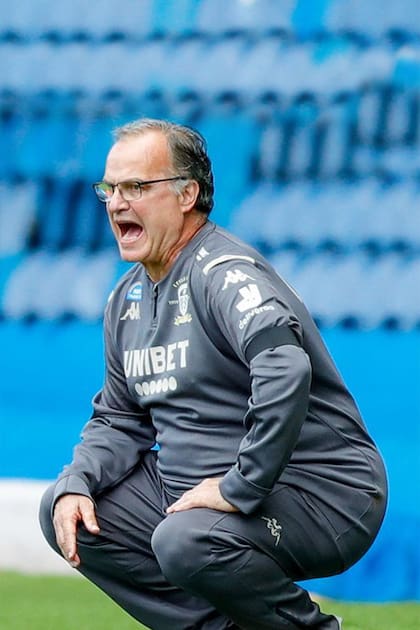
Bielsa, a neighbour in jogging pants: the ordinary life of an extraordinary man

No. You won’t find Marcelo Bielsa’s best-loved dish In Sant’ Angelo’s menu. They don’t serve shredded beef with grilled potatoes, carrots and pumpkin the way the man likes it: separately, so that the juice doesn’t spoil the side dish’s crisp. But it doesn’t matter. You may come across him in that joyful Italian restaurant located in the main street of Wetherby, the small village where he lives, northern Leeds. He will surely wear his dress suit, the same he wears at work.
How many jogging sets are there in Bielsa’s wardrobe? Which one will he put on to celebrate Leeds’ return to the Premier League, the news that the whole county of Yorkshire longed for 16 years? The same one he wore last October, when he flaunted his grey dress in the club’s centenary celebration? Nobody cares about the dress code now in this area of England overwhelmed by happiness. He feels that happiness too, but he reserves it for himself. At long last, sports success knocks on the door of somebody who likes defining himself as "a loser"! His last big achievement had lost its luster through the years: the gold medal in the Olympic Games of Athens 2004, the same year when Leeds were relegated. The extremes meet today.
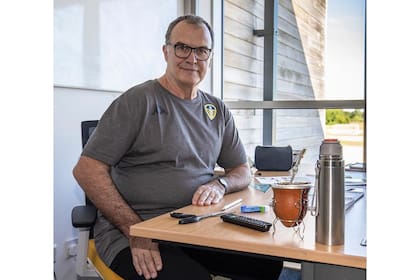
The Argentinian born in the city of Rosario arrived in Leeds two years ago. The city is witnessing a phenomenon that occurred in most of the teams where Bielsa worked after his professional exile from Argentina in 2007. His figure gradually turned into an object of veneration for the fans of a club deeply rooted in the spirit of the place. "When Leeds United go well, it is not an exaggeration to say that you can feel the change of mood in the city at many different levels. Marcelo has captured not just the fans’ imagination, but that of the whole city", wrote the leader of Leeds City Council, Judith Blake, in an e-mail.
The manager took up the challenge to rebuild a rusty giant, a football reference that had gone through decades without any big wins. After a terrific start, the team unbelievably failed to win promotion by the end of last season, a frustration that almost made the project collapse. In the last moment of Take us Home –a documentary series premiered by Amazon filmed during the entire season and whose first episode is named "El Loco", in Spanish–, the voice of the actor Russel Crowe explains why the project could go ahead: "Bielsa brought back hope and pride to the club and the city. Owners, directors, players and fans are banded together again. The sleeping giant has awoken and the revolution has just began", says Crowe, in an epic tone.
Why are walls painted, sculptures chiseled and beers brewed in his honor? The Catalan journalist Guillem Balagué said there is a decisive element: "The rate of unemployment is high in Leeds (4.3% before the pandemic, more than half a point than the rest of the country), so constituents feel left behind and forgotten. Having somebody who puts the city in the international spotlight makes him iconic, it turns him in something more than a manager".
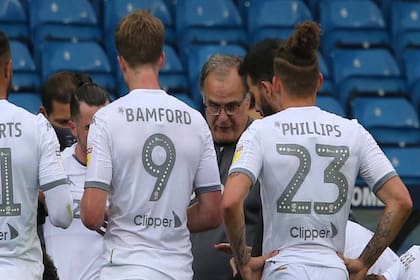
His brother Rafael Bielsa, who suffers and enjoys the progress made by the "master" from Santiago de Chile, drew a comparison: "The sense of belonging is a vital aspect that Marcelo values before accepting an offer. There is a common thread in his choices: Leeds, as well as Newell’s, Vélez, Athletic de Bilbao or Olympique de Marseille, transmits identity and engagement".
When the adventure began, by mid-2018, Balagué, who lives in London, moved for four days to the north of England to follow the phenomenon closely. This experience led to a podcast broadcast by BBC Radio, where he works. "The documentary made a big impact here. We contributed to spread that powerful image. Supporters are loving life with him. His playing style, with such a suffocating and kamikaze pressure, is something never seen before. It offers a halo of hope to a city that is quite depressed and obsolete". In her office, Black goes further: "We have embraced him as one of us", she underlines.
Rural Air
Why does he like them? Some time ago, in a press conference, Bielsa employed a mental image to explain why it had been so easy for him to adapt to living in the edges of Leeds, a city with a 793,000 population. "Most of the region is rural, and in my heart I’m a rural man", he described himself, without raising his gaze.
When the weather is on his side –there have been almost no rains in this unusual end of the season–, the coach puts on his backpack and hikes from the center of the village to Thorp Arch, the training ground remodeled at the request of Bielsa.
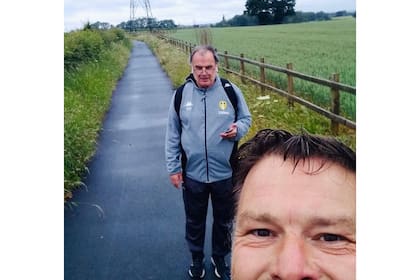
The tramp goes through a lovely green landscape and takes 50 minutes at a steady pace, all alone. He kindly refuses journalists offers for a lift and supporters’ company: he has always liked walking alone, be it in Ezeiza training ground, in the family’s countryside in Máximo Paz, in Guadalajara, in Santiago de Chile, in the outskirts of Bilbao, in Marseille or in Lille. Due to the virality of social media, the selfies captured along the rural scene by Leeds’ supporters became a real internet sensation: at the forefront stands the occasional fan, Bielsa behind, and an open view in the background.
That rural life is childhood itself. His brother recalls family memories: "We would spend our summers in the house of our maternal grandmother, nonna Marina, in Morteros, province of Córdoba, and although it was a village, it was quite rural: the colors, the smells, the silence… When Marcelo decided to become manager of Chile’s national team, one day he took a walk through Juan Pinto Durán training ground with Harold Mayne-Nicholls, the president of the Chilean Football Federation, and asked his permission to lodge in there. He pointed towards the Andes and said: "I would never forgive myself missing the opportunity to wake up and go to bed looking at this wonder".
The coronavirus, a nervous pause in the road map toward the promotion to the elite division, forced Bielsa to change his beloved ordinary neighbor’s lifestyle. His fellow nationals who usually chat in the Facebook group "Argentinos en Leeds" amuse themselves by looking for him in the streets of Wetherby, a wealthy area of 22,000 residents where 9 out of 10 people have central heating at home to overcome chilly winters.
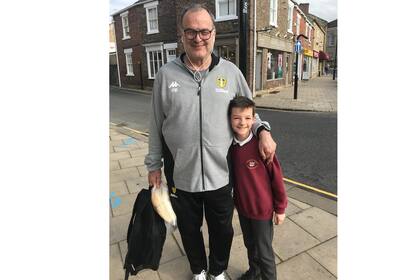
But, for some months, his sweatshirt didn’t turn up anymore on a side table in Costa Coffee, where he has an open monthly account; you couldn’t see him pushing his trolley in the supermarket Morrisons any longer; and he wouldn’t show up so often in Cooplands, the bakery located in Market Place, the main road. He spent the lockdown mainly isolated in the home where he lives after leaving the luxurious Rudding Park Hotel, where he first lived in England. He watched football, of course, as he did in his early days as manager in his home in Rosario, where he had a structure made to support four TV sets, one beneath the other: a lost battle against his obsession for the ball.
How did he get to Wetherby? It’s an odd story. Bielsa searched tirelessly until he found what he was looking for: an austere apartment over a shop, in the quiet commercial area of the village. His wife, Laura, spends some months with him during the year, as she splits her time between Leeds and Rosario, their family’s hometown. Inés (30) and Mercedes (28), their daughters, have their own agenda in Argentina, and their sporadic visits to Leeds are also an excuse to take a trip to a more appealing tourist destination. "Marcelo doesn’t know how to enjoy usual pleasures. He doesn’t need more than two bedrooms, a living-room, a good bathroom and not much more than that. With houses, cars, watches, tattoos, clothing… He’s old fashioned with all that", confirms his brother… and first admirer.
Closed to strangers
That small story describes just a part of Bielsa’s personality, often celebrated by his adepts, but it doesn’t paint the whole picture. Who can go so far, dig into his privacy and know his feelings? Very few. In Thorp Arch, the manager keeps his discipline at work, a high level of demand on the footballers and expects total commitment from his staff. But those walls are impenetrable. It is something learned by any outsider to the cause wishing to establish an informal contact: the head coach’s assistants raise barriers right away.
A worthy detail to note: during the production of this article, LA NACIÓN asked a former member of Bielsa’s staff the list with the names of the current staff members: "I must have the authorization from Marcelo and from them all", was the dry answer. The club’s official website doesn’t publish the names iether. The pursuit of such simple information is useful to understand the closed-door policy governing the manager’s land.
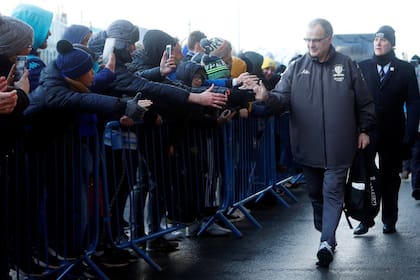
The walls of Bielsa –who will turn 65 next 21 July, a day before Leeds’ farewell match of the Championship– are impenetrable even for his hirers. In January 2019, Leeds’ owner –the Italian businessman Andrea Radrizzani– only knew a couple of minutes before that Bielsa would respond to the famous episode known as Spygate by delivering a press conference in which he would share the information gathered concerning almost all rivals. The decision of opening his Power Point to the world illustrates the way Bielsa relates to his bosses: he respects his own viewpoint until the end, although that may expose him to unbelievable situations. "We would have preferred that those explanations were kept private", is all that Radrizzani could say then. And they kept on working together.
Bielsa’s circle of confidence includes two of his compatriots: Diego Flores (Assistant Head Coach), from Córdoba, and Pablo Quiroga (video analyst), from Buenos Aires. Both of them have common characteristics: an unknown past and a profound admiration for a manager they fell in love with at a distance. Flores and Quiroga now hold positions that Eduardo Berizzo and Luis Bonini have held for many years. Besides his specific task, this season Flores acts as Bielsa’s translator in press conferences; his boss –who never speaks English in public– corrects him if he’s not satisfied with the translated passage. In January, after a defeat, Bielsa said that Leeds had had "twice or three times" more goal-scoring chances than his rival; Flores opted to translate that the chances had been "many more". Error: the manager insisted until his assistant translated as he wished. For him, that minimum nuance was worth a live interruption.
A loser who opens minds
Obsessed with the precise word and always willing to argue, Bielsa could be at a disadvantage, as he doesn’t address the footballers in English. Rafael, his transatlantic goalkeeper, doesn’t share that opinion: "He would be at a disadvantage if he was one of those managers who become friends with the players. In that case, speaking the language would be more necessary. During the week, his assistants perform the exercises he planned. During the match, he only gives very simple indications to the players. And for the halftime, crucial for Marcelo, he keeps in mind, with an absolute clarity, what he wants to express to the players, so the translation becomes easier", says Rafael.
Balagué, on the other hand, is convinced that an intangible of great value is lost on the way: "Bielsa’s speech is interesting enough to attract the supporters and make players reflect, but there is a paradox: the poetry of his words, the way he says it, doesn’t affect anybody, except those who understand Spanish". Hasn’t his English progressed in these two years? "He understands it and he speaks it, but he is shy. Many speak average English after their third whisky, but the thing is that Marcelo doesn’t drink alcohol", says Rafael, with humour.
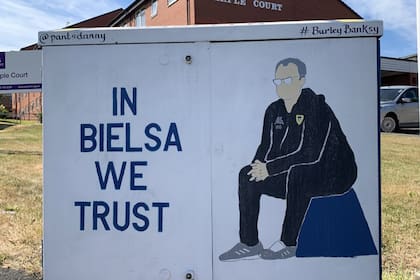
That language barrier didn’t prevent him from appreciating the values he perceives in his players: "I’ve mainly worked with British players here, and others are Europeans. They have an understanding of professionalism that I find very attractive", he praised them before getting the promotion. "Some of these players are thinking of becoming managers because of him", observes Balagué.
Therein lies, maybe, the main strength of Bielsa’s career: his capacity to make players follow him as a master, become passionate about the game and –as shown by so many stories– mirror him when they think about their next steps in the sport. It is not his intention, but he teaches. And sometimes a vocation is born. Wherever he goes, he manages to engage the club –and the city, in many cases– in the project he leads. His legacy is worth more for these intangibles than for the sports achievements. Champion twice in Newell’s at the beginning of his career as manager, in Vélez in 1998, and in the cited Olympics in 2004, he is often remembered as the manager of the Argentina national team that was one of the top candidates to win the 2002 FIFA World Cup, but couldn't even make it through the group stage. That is certainly the frustration that affected him most.
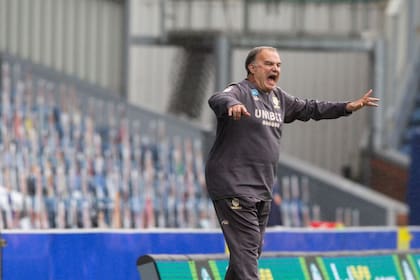
The "loser" mask he himself mentions was fueled by the incredible final lost to Brazil in Copa América 2004 –missed by Argentina when it seemed won– and the two finals he couldn’t win in 2012 with the Athletic de Bilbao in a period of a month. But these two defeats should be perceived as an asset: the strange thing is that he could have gone so far with a team that, by the time he took charge, lived more on its glorious past rather than on its mediocre present. The same happened in Leeds United.
Blake, who has headed the city for five years, praises him to the skies: "It is not just the fantastic football style that the team is playing, or how Marcelo has managed to transform it and get a 10% extra from many players. It’s his general approach of football as a whole. He recognizes the importance of fans, and how the game becomes nothing without them. It is his passion, his engagement, his meticulous attention to details, and also his modesty", she acclaims.
Mr. Jogging Suit
There are habits that Bielsa take with him wherever he goes. For example, living far from the spotlight. Wetherby is practical to go to the training ground, but the drive takes more than half an hour from the village to the centre of Leeds or to Elland Road, the stadium. That’s nothing new for him: during the two years he managed Athletic de Bilbao –the European destination that touched him most–, the coach lived with his wife close to the beaches of Getxo, at a 25-minute drive from San Mamés Stadium. Even then, his preference for wearing sports uniforms was his trademark, to the point that the Basque press called him jokingly "Mr. Jogging Suit".
Bielsa left Bilbao after a very poor second season, but the memory of all he had given prevailed: the teaching spirit, the unlimited dedication, the identification with a cause that he adopted as his own, the enthusiasm to give back the missed glory to a landmark club. Another common point with the experience in Leeds.
Of all the tales that circulate in Bilbao even today –seven years after his farewell–, the most picturesque one is as follows: it is said that one Sunday evening, Bielsa was looking for a place to dine in Getxo and found a light on in a small restaurant. Inside there was just the owner, who was about to close the door. Confronted to the untimely question of the celebrated visitor, the man didn’t dare to refuse a table on time grounds. And since that night, the owner waited for him on Sundays, and they would also have dinner together. Nowadays, in the massive stadium inaugurated anew some month after the coach’s departure, Athletic Museum visitors can admire, amid hundreds of football shirts… Bielsa’s jogging suit!
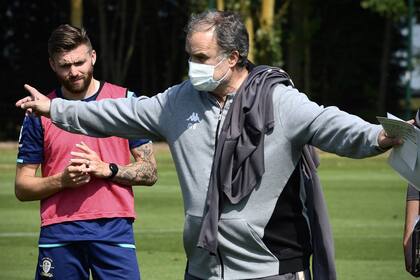
The family picture taken the evening of Leeds’ centenary proves that, far from fearing memes (does he by chance know what they are?), the habit turned into a mandate in his mind. 69 people, including the squad, authorities and club legends posed for the pictures: 68 of them wore suits or dinner suits.
When did he become a fan of jugging suits? His brother, who spends lockdown in the Argentine official residence in Santiago de Chile waiting to take up position officially as ambassador to that country, believes Marcelo’s life took a turn when he was appointed Argentina national team manager, by the end of 1998. "He got rid of suits and blazer suits and turned to jogging suits. It was, as is usually the case with him, a drastic decision", says Rafael.
Last year, Leeds won the Fifa Fair Play Award for a gesture ordered by Bielsa: letting Aston Villa score to equalise the goal scored immediately before, when a Villa player was down injured. In September, Bielsa didn’t turn up at the luxurious awards ceremony held at the Scala Theater in Milan: it is believed in Leeds that he preferred not to exhibit his costume in such an alien and glamorous environment.
The smell of the Premier League
Gabriel Sadi is an Argentine university professor who settled in Leeds at the beginning of January. Like millions of people around the world, his plans have been affected by the pandemic, not because he had to stop delivering lectures at the University of Huddersfield –he does it online now–, but because his family couldn’t leave their house in Buenos Aires and start up a new life in Yorkshire. As he waits for the storm to pass, Gabriel finds in Bielsa’s Leeds a reason to liven up his video call with Tomás, his 7-year-old son. A painkiller for an unexpected anxiety and sadness. Gabriel promised his son they will go together to a Premier League match in Elland Road, when he and his mother, Lili, are able to join him in England. "What I have observed during this time –says the academic to LA NACION from Moortown, his new neighborhood– is that Leeds awakens mixed passions: Argentine-like passion in his supporters, and contempt in other teams. In light of these circumstances, the fact that Bielsa has brough the team back into the spotlight has a double effect: it boosts that feeling, and also the image of hero or guardian angel they have of him".
With more than a 30-year career, how much stamina does he have to compete in the level required by the Premier League? "He has a lot of energy. As long as he keeps it, and his mind declines slower than the body, I see him managing for a long time", says Rafael, enthusiastic. Recent experiences show that the second season of the Argentine in a club tends to be worse: the players’ enchantment and even initial devotion usually lead to mental burnout due to the ever-demanding level of engagement. But Bielsa could break that trend in Leeds, despite the doubts cast by the club itself on how it was all going to end. The second year ended up being better than the first.
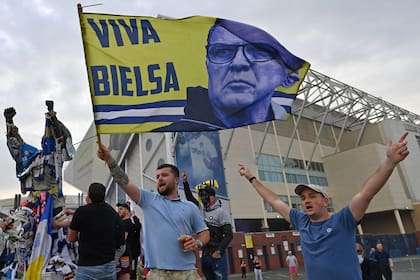
Now, having gone a long way as a manager, he approaches an unprecedented development in his career. How about managing for three years in a row in the same team? Not even in Newell’s did that happen. Should he need a stimulus, there he has it! But being part of the best league in the world sounds like enough motivation to go on managing.
Blake knows where Leeds United is heading for, but she doesn’t overlook its past: "We have been out of the Premier League for so long, and we have suffered very turbulent times, inside and outside the football field. After so long, Marcelo has given us real hope and the belief that we can have happy times again and emulate our past glories.
Balagué, who In the end is a journalist, is already envisioning the next match: "Can you imagine a duel Bielsa-Guardiola? It will be great!", he predicts. Blake expresses a wish that she feels is shared by the majority of the constituents: "I can say confidently in the name of the city that we hope that Marcelo stays and manages Leeds for a long time. We are very lucky to have him".
Who knows, maybe the ultimate incentive for Bielsa to go on writing new chapters in Leeds is hidden in a food recipe. By dint of seeing him sit at a table, perhaps the chef in Sant’ Angelo learns to prepare the meat and vegetables according to his taste: all served it in two plates, of course, to keep the crisp.

Translation of Jaime Arrambide.
Más notas de Leeds United
Más leídas de Fútbol
Scaloni sube la vara. Quiénes son los que necesitan mejorar en 2025 para no quedar abajo de la selección
Detalles. Final de la Copa Sudamericana 2024: cuándo se juega el partido Racing vs. Cruzeiro
Una vida a puro Racing. Siete compañeros de ruta en el club describen la pasión de Costas por la Academia
Punto final. Claudio Vivas, que había asumido tras la salida de Alfaro, quería seguir como DT de Costa Rica, pero no lo dejaron





